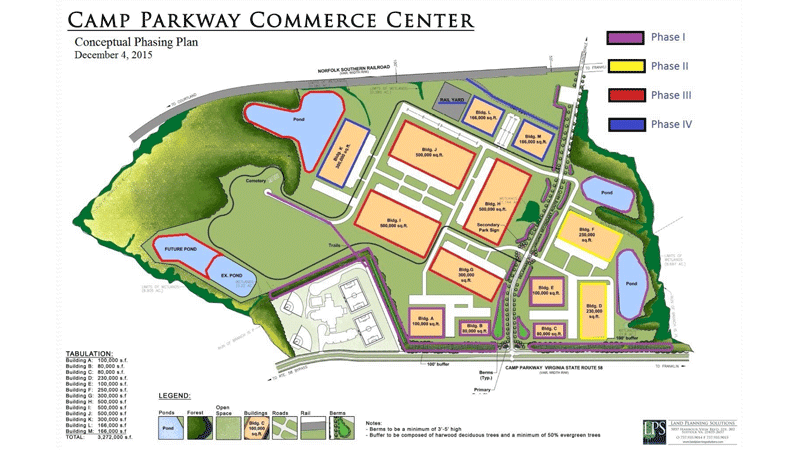Planning Commission asked to study rezoning Camp Parkway land
Published 4:54 pm Monday, September 11, 2023

- Depicted is a conceptual phasing plan from Dec. 4, 2015, of Camp Parkway Commerce Center, which sold June 27 to Southampton Lance LLC for $11.4 million for the expected purpose of providing warehousing storage, according to Southampton County Board of Supervisors Chair Dr. Alan W. Edwards. (Submitted by Southampton County)
|
Getting your Trinity Audio player ready...
|
The Southampton County Board of Supervisors voted 5-2 at its Aug. 22 meeting to instruct the Southampton County Planning Commission to study a potential rezoning of the Camp Parkway Commerce Center land that the commission could bring back to the board for consideration in the future.
The dissenting votes came from Southwest District Supervisor Carl J. Faison and Southeast District Supervisor Robert T. White.
Three parcels totaling 435 acres located along Camp Parkway and on either side of Delaware Road were sold for $11.4 million on June 27 by VOS LLC to Southampton Lance LLC, a Delaware company that was formed June 26.
Franklin Southampton Economic Development Inc. President and CEO Karl T. Heck previously explained that Southampton Lance is essentially a land company set up by Lecangs, which is a logistics company and also a subsidiary of Loctek Ergonomic Tech, a company that is listed on the Shanghai stock exchange and that is listed online as being headquartered in China.
Multiple Southampton County supervisors have expressed concerns about the Camp Parkway sale due to the power exerted by the Chinese Communist Party upon operations within China and the proximity of the Camp Parkway Commerce Center to Naval Station Norfolk, which is the world’s largest naval station.
Central District Supervisor and Board Chair Dr. Alan W. Edwards had previously mentioned receiving a call from a member of the Pentagon working within the Department of the Air Force. Edwards prompted Southampton County Administrator Brian S. Thrower to provide a report of what this individual had to say with regard to the Camp Parkway purchase.
Thrower read from an email that he had previously sent to the board.
“I wanted to let you know that I was contacted by Dan Burke of the Air Force this morning,” he wrote. “He is with the Air Force Office of Special Investigations. He is investigating the transaction of the recent land sale between the two private parties involved.”
Thrower stated that for transactions such as the one involving the Camp Parkway Commerce Center, Burke said the foreign-owned company should file with The Committee on Foreign Investment in the United States for the transaction to be reviewed for potential national security risks.
“Given Southampton County’s location to military facilities in Hampton Roads, he is investigating this matter,” Thrower stated. “If this transaction/company is determined to be a national security risk, the federal government could ‘unwind’ this transaction.”
Thrower offered a couple of other comments in reference to the Camp Parkway transaction, including a reminder that the current zoning of the land in question was put in place in 2016.
The Board of Supervisors voted 6-1 on July 5, 2016, to approve a request to rezone a 438.71-acre parcel of land on Camp Parkway from A-2 (agriculture) and R-1 (residential) to CM-1 (conditional limited industrial) with proffers. The decision followed a public hearing in which 23 community members spoke in favor of the rezoning, and 20 spoke against it.
Edwards was the lone member of the Board of Supervisors to vote against the rezoning.
Thrower reminded everyone at the Aug. 22 meeting that the Camp Parkway sale was a transaction between two private parties.
“Localities do not regulate, nor do they oversee private transactions between private parties,” he said. “Ninety-nine percent of the time, the locality does not know a transaction has occurred, so that’s not the role of the locality. The only thing that the locality controls is zoning… And the purchaser of the property is a parent company that is Chinese-based but not the Chinese government.”
Edwards later shared his perspective on Loctek Ergonomic Tech, saying, “There’s no such thing as an independent Chinese company. Chinese companies are owned by the Chinese government, and they’re governed by the Chinese Communist Party, the CCP. Everybody needs to realize that.”
Thrower said he read some of the materials provided by Burke in reference to foreign-owned companies filing with The Committee on Foreign Investment in the United States.
“They say … filing with this agency is voluntary,” Thrower said. “And it also says all information obtained should be obtained legally and voluntarily and appropriately protected, so apparently even that process is a voluntary process.”
Edwards described the current zoning of the Camp Parkway land as inappropriate for that area of the county, and it ultimately paved the way for the Chinese company to come in and buy it.
He offered support for the “unwinding” of the sale, if possible.
Southwest District Supervisor Carl J. Faison, who was on the Board of Supervisors in 2016, noted that the board had a choice to rezone the property, and it did so, which was within its right.
“Now we’re dealing with a Chinese company,” he said. “That zoning at that time was done without any anticipation that somebody from China would be interested in it, so to make that connection, I think, is unfair, because for the amount of money that this company is paying for this land, I’m not convinced that the type of zoning would have changed it. It appears to me they want the land.
“I agree with what Dr. Edwards is saying — anything we can do to change it to the point that it could not be sold to a Chinese company, I think we want to do that,” Faison continued. “We should do that. But at the time that this particular zoning was made, I don’t think anybody on that board anticipated the Chinese company would be interested in it.”
Northeast District Supervisor Christopher D. Cornwell Sr. said, “They wanted the land because it was easy, because it was zoned like it is now. My concern is, what type of legal ramifications are we going to have if we zone it back? Now they’ve done bought it, they’ve done paid $11 million for it, top dollar, way more than what it’s worth. If we zone it for a use that they have no use for, as Dr. Edwards mentioned — the CCP’s got a whole lot more money than Southampton County does.”
Cornwell said he would be interested to discuss with legal counsel what type of legal ramifications the county could face if it did zone the Camp Parkway property to some of the other options the board was considering in 2016.
White asked, “Can you actually rezone a piece of property to a different zoning without the property owner applying for the rezoning?”
Thrower said, “A governing body can initiate a rezoning anytime, provided you go all through the steps outlined in the state code with providing notice, a public hearing, etc. So as long as you meet the stipulations in the state code for notification requirements, public hearing requirements, the governing body can initiate a rezoning. Most of the time it is done by a property owner or a prospective property owner, but a governing body can initiate a rezoning.”
However, he made a point to say that he would not be surprised if the county were sued if it rezones the Camp Parkway property.
He said the first step in initiating a rezoning would be sending the issue to the Planning Commission.
“You can initiate that tonight,” he said.
Edwards, who sits on the Planning Commission, said the commission has “already discussed multiple times about changing that Comprehensive Plan in that area, so it’s not a new idea.”
R. Edward Railey III, of Railey and Railey Attorneys at Law, provided legal advice to the board during the Aug. 22 meeting. He asked Northwest District Supervisor and Board Vice Chair William Hart Gillette if Burke provided a timeline for the investigation into the sale.
Gillette indicated that Burke had not yet received the information he needs.
“He gave me a pretty strong indication that they were going to investigate it, and it is a possibility — I’m not going to say it happens — but it is a possibility to unwind the whole thing, but that’s going to have to go through the investigation up at the Pentagon,” Gillette said.
Cornwell added, “In the packet presented with that documentation to the rest of the board, it indicates Day 90 the investigation ends, if that gives anybody any type of idea.”
Railey shared his opinion on what will happen if the county attempts to rezone the Camp Parkway land.
“It’s an unpopular position, but I think this purchaser of this property will probably sue us immediately for interference with private contract,” he said. “It was rezoned legally a long time ago.
“There’s become an issue with China and an issue obviously with the traffic, but they bought a piece of property for $11,400,000 with the zoning that they desired on it,” he continued. “To think that they’re not going to take action would probably be faulty analysis.
“That’s why I raised the question about what the Department of the Air Force could do,” he added. “If they could stop this, then it would eliminate any liability the county has. But that’s my position.”
He said he spoke with an attorney of the land purchaser to see what the company was planning on doing.
“He assured me they’re not a part of the Communist Party,” Railey said. “I don’t know that to be true or not, but he said that he would file suit before the end of the week if his client’s deal is interfered with. So that’s just something that we have to consider.”
Railey noted that the representative of the purchaser would appreciate the opportunity to fly to Virginia to give a presentation with respect to the project.
“I would recommend that he be given that opportunity regardless of what the Planning Commission and the board do,” Railey said. “I just think that that would probably be a good strategy to avoid litigation. This is a big-money deal that if we were to lose, it would be very expensive.”
Edwards encouraged sending the issue of rezoning to the Planning Commission to at least let it start looking at rezoning.
“You can’t get sued for looking at something,” he said.
White said he was not for a motion to formally send the issue of rezoning to the commission.
Cornwell said, “I understand why Robert’s going to vote against it, and I’m going to vote for it only because we’re just going to allow them to look into the prospect of doing it. And I have some trepidation because of the legal ramifications of what’s going to happen if we do it, and I see us sorting through that possibly in the next phase of this project, and I’m willing to vote ‘yes’ now only so that we can explore it in that next phase.”
White said he did not think the board needed to vote on it. He indicated that the commission could explore it anyway and that the board voting on the matter was just “opening up a can of worms.”










